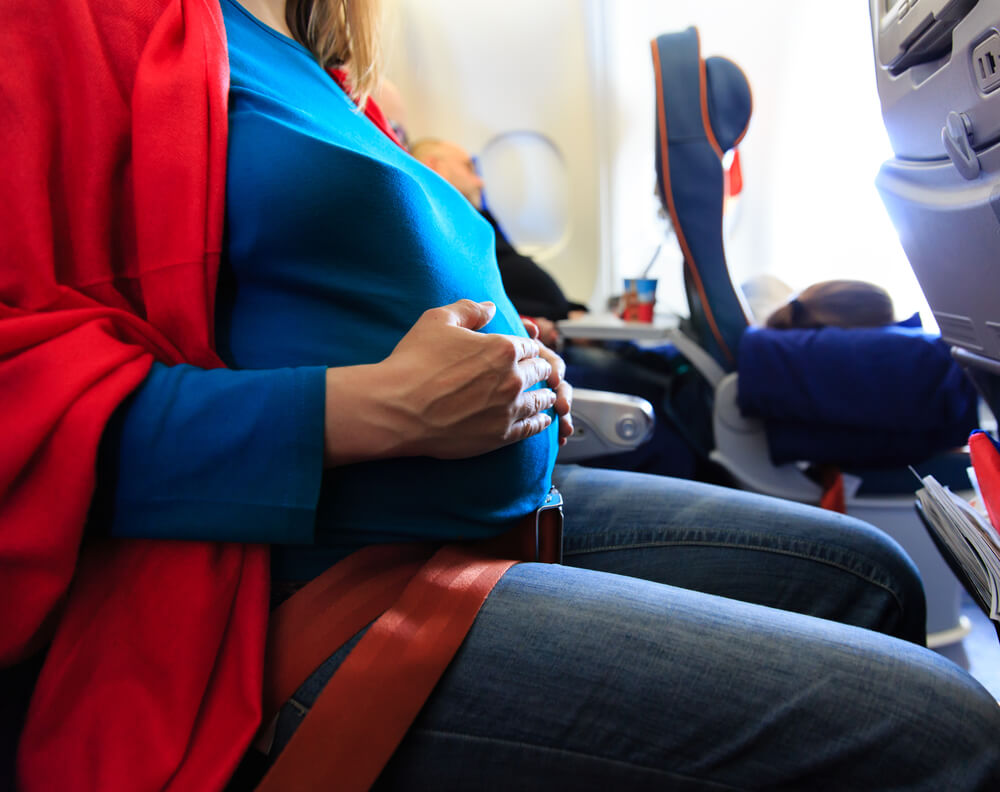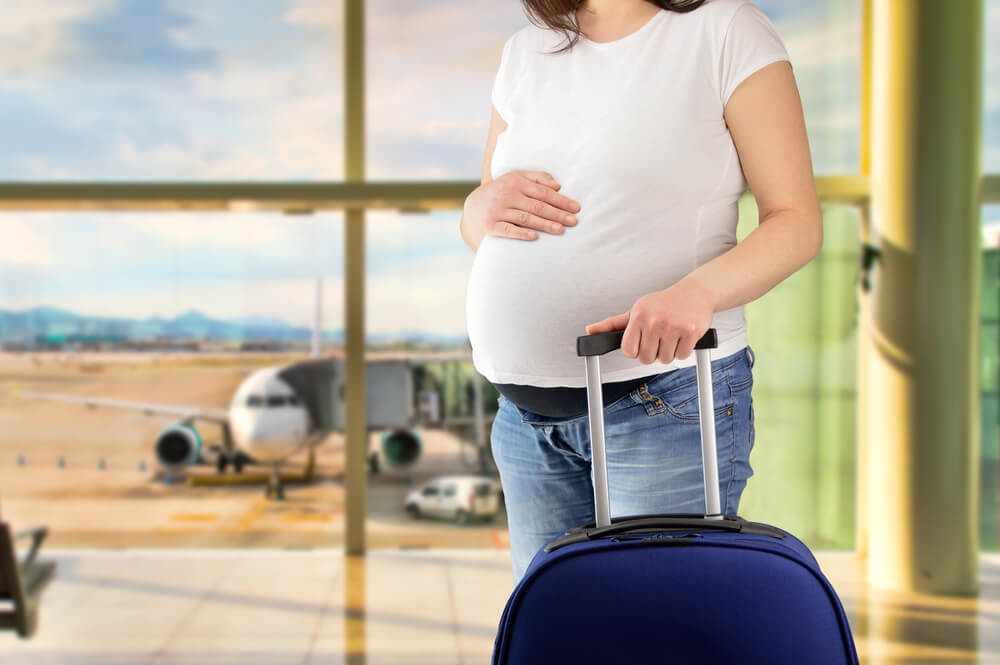Traveling during pregnancy can be a memorable and fulfilling experience if you prioritize your well-being and follow safety guidelines. This comprehensive guide will help you navigate the world of pregnancy travel, combining essential advice from medical experts with practical tips from experienced travelers.
In this article, the team at University Park OBGYN helps you explore how to make your journey safe, comfortable, and worry-free while
Traveling While Pregnant: What to Consider

Before packing your bags, take some time to evaluate whether travel is safe for you during your pregnancy. It’s essential to consider your overall health and the circumstances surrounding your trip.
- Consult your healthcare provider: It’s crucial to get the green light from your healthcare provider before embarking on any journey during pregnancy, especially if you plan to travel internationally or have a high-risk pregnancy.
- Destination matters: Before planning your trip, check for country-specific travel restrictions and guidelines, as many international destinations may still be off-limits for U.S. travelers.
Timing Your Trip
The timing of your journey is crucial for your comfort and safety. While healthy pregnant individuals can typically travel up until a month before their due date, it’s essential to be aware of certain restrictions and recommendations.
- Consider the second trimester: Many women find the second trimester, spanning weeks 14 to 27, to be the most comfortable time for travel. During this period, you’ll likely have fewer pregnancy symptoms, such as nausea, and more energy.
- Understand travel limitations: Different modes of travel have various restrictions for pregnant travelers. For example, many cruise lines won’t allow women to board farther along in their pregnancy, and some airlines have specific policies for pregnant passengers. It’s essential to be aware of these limitations when planning your trip.
Preparing for Your Journey
Proper preparation is the key to a smooth and safe travel experience during pregnancy. Here are some steps to consider:
- Discuss travel plans with your airline: Airlines may have particular regulations regarding pregnant passengers, especially if you plan to travel during the third trimester. Some airlines have restrictions on how late in pregnancy you can board a plane, while others require a note from your doctor confirming it’s safe for you to fly.
- Choose your destination wisely: If you’re traveling to a hot and sunny location, ensure your accommodations and transportation are air-conditioned, and remember to stay hydrated and protected from the sun. If you’re heading to a high-altitude area or a region with potential disease risks, consult your healthcare provider before traveling.
- Prioritize relaxation: Pregnancy can be physically demanding, so consider a travel itinerary that allows you to set the pace. Balance sightseeing and activities with time to rest and put your feet up.
Health and Safety While Traveling
While on the road, ensure your health and safety with these essential tips:
- Get travel insurance: Sign up for reliable travel insurance, especially if your pregnancy complication necessitates changing your plans. Consider medical evacuation insurance for international trips, which can be crucial in emergencies. Review your insurance policy to ensure you have adequate coverage.
- Have access to medical care: When traveling far from home, it’s a good idea to have the contact information of a local OB/GYN in case of an emergency. Additionally, carry a copy of your health records, especially when traveling internationally.
- Prepare a pregnancy medical kit: Pack a kit with prenatal vitamins to last your trip and other essentials, such as preparations to alleviate common pregnancy discomforts. Don’t forget a copy of your health records and a list of emergency contacts.
Travel Tips for Pregnant Women
No matter how you choose to travel, these tips will enhance your comfort and safety:
- Choose your seat strategically, with aisle seats often being the most convenient for pregnant travelers.
- Stand up and stretch regularly to prevent blood clots, a concern during pregnancy.
- Stay well-hydrated, which helps reduce swelling and prevents blood clots.
- Maintain a healthy diet, eating small, frequent meals to alleviate nausea and prevent discomfort.
- Take restroom breaks promptly to avoid urinary tract infections and constipation.
- Ensure proper seatbelt use, positioning it under your bump for comfort and safety.
- Use a rolling suitcase to avoid heavy lifting, and don’t hesitate to ask for assistance when needed.
Seeking Medical Care During Travel
If you encounter any pregnancy-related emergencies or symptoms during your journey, it’s crucial to know when to seek medical care. Go to the nearest hospital or medical clinic if you experience any of the following:
- Pelvic or abdominal pain
- Vaginal bleeding
- Contractions
- Rupture of the membranes (your water breaking)
- A persistent headache, vision changes, or swelling in your face or hands (possible signs of preeclampsia)
- Leg pain or swelling
- Severe vomiting or diarrhea
Risks of Traveling During Pregnancy
Flying while pregnant is generally considered safe, but there are potential risks and scenarios in which it may not be recommended for expectant mothers. Understanding these risks is essential to make informed decisions about your travel plans.
Possible Risks:
- Dehydration: The air in planes can be dry, which may lead to dehydration, a common concern during pregnancy. Dehydration can contribute to issues such as swelling, dizziness, and fatigue. To combat this, drink plenty of water before, during, and after your flight.
- DVT (Deep Vein Thrombosis): Pregnant women are at a higher risk of developing deep vein thrombosis, a condition where blood clots form in the deep veins of the legs. Long periods of sitting during a flight can increase this risk. To minimize the chance of DVT, remember to perform leg exercises, walk around the cabin if possible, wear well-fitting elastic compression stockings, and discuss your travel plans with your doctor.
- Premature Labor: Although the evidence is inconclusive, some experts suggest that air travel during the last six weeks of pregnancy may increase the risk of early labor. Airlines may have policies in place regarding when pregnant women can fly, so be sure to check with your carrier.
When Flying is Not Recommended: When Should You Stop Traveling When Pregnant?

- High-Risk Pregnancy: If you have a high-risk pregnancy due to complications such as preeclampsia, gestational diabetes, or a history of premature labor, it’s generally not recommended to fly. Always consult your healthcare provider to assess the safety of your travel plans.
- Complications or Symptoms: If you’re experiencing symptoms like vaginal bleeding, contractions, or a ruptured membrane (your water breaking), flying is not advisable. Seek immediate medical attention if any of these symptoms occur.
- Airline Policies: Some airlines have specific policies regarding pregnant passengers. It’s common for airlines to restrict travel during the late stages of pregnancy (typically after 36 weeks) or to require a doctor’s note for clearance. Always check with your chosen airline to understand its policies and restrictions.
- International Travel: International travel may pose additional challenges for pregnant women. Different countries have varying healthcare standards, and access to medical care might not be as straightforward as in your home country. Assess the risks associated with international travel with your healthcare provider.
While flying during pregnancy is generally safe, it’s essential to be aware of potential risks, especially if you have a high-risk pregnancy or are traveling during the late stages of pregnancy. Always consult your healthcare provider and check with your airline to ensure your safety and peace of mind during your journey.
Traveling While Pregnant: Follow The Guidelines
Traveling during pregnancy can be a beautiful and memorable experience, and with the right precautions, it can be done safely and comfortably. By considering your health, timing, destination, and essential safety measures, you can confidently embark on your journey.
Remember to consult your healthcare provider, follow current guidelines, and prioritize your well-being while making cherished memories on your travels. Safe and happy travels!
On that note, you can also schedule a consultation with us. We’re also more than ready and happy to help.


